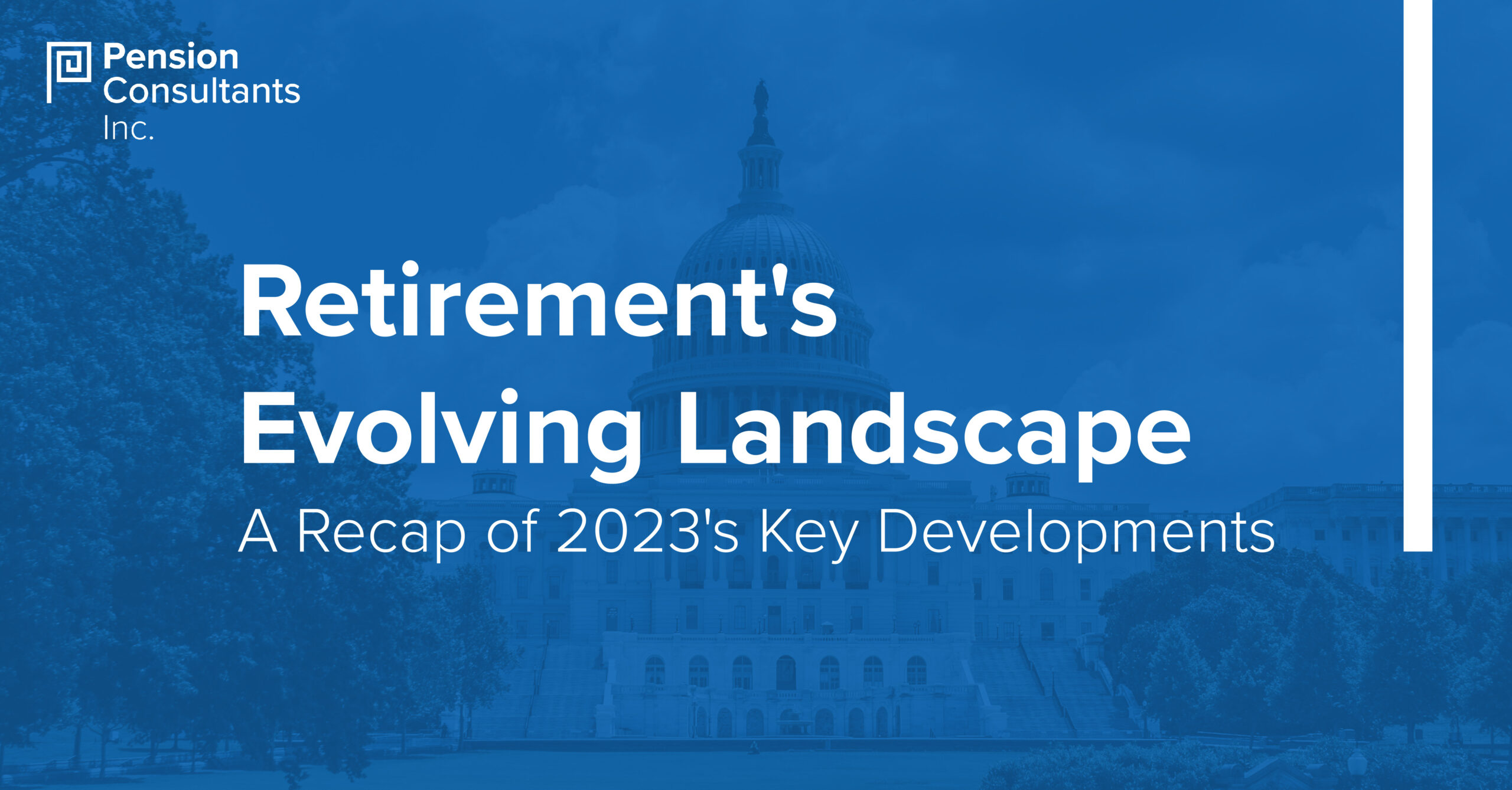Insights
Don’t Miss Another Update
Want to receive these articles directly to your inbox? Subscribe and we’ll send you information to help you plan for your company’s retirement.

Loading articles
Sort by:

Plan Fees
News and Updates
12 JANUARY
by David Norman
PCI Recently Featured in RPA Convergence, “RPA Plan Pricing Is in Dire Need of a Refresh”
In recent InvestmentNews’ RPA Convergence article, “RPA Plan Pricing Is in Dire Need of a Refresh,” Fred Barstein, Consulting Editor and Founder of 401kTV and…
READ MORE
Plan Fees
News and Updates
12 JANUARY
by David Norman
PCI Recently Featured in RPA Convergence, “RPA Plan…
In recent InvestmentNews’ RPA Convergence article, “RPA Plan Pricing Is in Dire Need of a Refresh,” Fred Barstein, Consulting Editor and Founder of 401kTV and…
READ MORE
Plan Fees
News and Updates
12 JANUARY
by David Norman
PCI Recently Featured in RPA Convergence, “RPA Plan…
In recent InvestmentNews’ RPA Convergence article, “RPA Plan Pricing Is in Dire Need of a Refresh,” Fred Barstein, Consulting Editor and Founder of 401kTV and…
READ MORE
Plan Fees
News and Updates
12 JANUARY
by David Norman
PCI Recently Featured in RPA Convergence, “RPA Plan…
In recent InvestmentNews’ RPA Convergence article, “RPA Plan Pricing Is in Dire Need of a Refresh,” Fred Barstein, Consulting Editor and Founder of 401kTV and…
READ MORE
Plan Fees
News and Updates
12 JANUARY
by David Norman
PCI Recently Featured in RPA Convergence, “RPA Plan Pricing Is in Dire Need of a Refresh”
In recent InvestmentNews’ RPA Convergence article, “RPA Plan Pricing Is in Dire Need of a Refresh,” Fred Barstein, Consulting Editor and Founder of 401kTV and…
READ MORE
Plan Fees
News and Updates
12 JANUARY
by David Norman
PCI Recently Featured in RPA Convergence, “RPA Plan…
In recent InvestmentNews’ RPA Convergence article, “RPA Plan Pricing Is in Dire Need of a Refresh,” Fred Barstein, Consulting Editor and Founder of 401kTV and…
READ MORE
Plan Fees
News and Updates
12 JANUARY
by David Norman
PCI Recently Featured in RPA Convergence, “RPA Plan…
In recent InvestmentNews’ RPA Convergence article, “RPA Plan Pricing Is in Dire Need of a Refresh,” Fred Barstein, Consulting Editor and Founder of 401kTV and…
READ MORE
Plan Fees
News and Updates
12 JANUARY
by David Norman
PCI Recently Featured in RPA Convergence, “RPA Plan…
In recent InvestmentNews’ RPA Convergence article, “RPA Plan Pricing Is in Dire Need of a Refresh,” Fred Barstein, Consulting Editor and Founder of 401kTV and…
READ MORELets Get Started
Ready to Evaluate Your Plan’s Performance?
Ready to Evaluate Your Plan’s Performance?
Get Started
Plan Fees
News and Updates
12 JANUARY
by David Norman
PCI Recently Featured in RPA Convergence, “RPA Plan Pricing Is in Dire Need of a Refresh”
In recent InvestmentNews’ RPA Convergence article, “RPA Plan Pricing Is in Dire Need of a Refresh,” Fred Barstein, Consulting Editor and Founder of 401kTV and…
READ MORE
Plan Fees
News and Updates
12 JANUARY
by David Norman
PCI Recently Featured in RPA Convergence, “RPA Plan…
In recent InvestmentNews’ RPA Convergence article, “RPA Plan Pricing Is in Dire Need of a Refresh,” Fred Barstein, Consulting Editor and Founder of 401kTV and…
READ MORE
Plan Fees
News and Updates
12 JANUARY
by David Norman
PCI Recently Featured in RPA Convergence, “RPA Plan…
In recent InvestmentNews’ RPA Convergence article, “RPA Plan Pricing Is in Dire Need of a Refresh,” Fred Barstein, Consulting Editor and Founder of 401kTV and…
READ MORE
Plan Fees
News and Updates
12 JANUARY
by David Norman
PCI Recently Featured in RPA Convergence, “RPA Plan…
In recent InvestmentNews’ RPA Convergence article, “RPA Plan Pricing Is in Dire Need of a Refresh,” Fred Barstein, Consulting Editor and Founder of 401kTV and…
READ MORE
Plan Fees
News and Updates
12 JANUARY
by David Norman
PCI Recently Featured in RPA Convergence, “RPA Plan Pricing Is in Dire Need of a Refresh”
In recent InvestmentNews’ RPA Convergence article, “RPA Plan Pricing Is in Dire Need of a Refresh,” Fred Barstein, Consulting Editor and Founder of 401kTV and…
READ MORE
Plan Fees
News and Updates
12 JANUARY
by David Norman
PCI Recently Featured in RPA Convergence, “RPA Plan…
In recent InvestmentNews’ RPA Convergence article, “RPA Plan Pricing Is in Dire Need of a Refresh,” Fred Barstein, Consulting Editor and Founder of 401kTV and…
READ MORE
Plan Fees
News and Updates
12 JANUARY
by David Norman
PCI Recently Featured in RPA Convergence, “RPA Plan…
In recent InvestmentNews’ RPA Convergence article, “RPA Plan Pricing Is in Dire Need of a Refresh,” Fred Barstein, Consulting Editor and Founder of 401kTV and…
READ MORE
Plan Fees
News and Updates
12 JANUARY
by David Norman
PCI Recently Featured in RPA Convergence, “RPA Plan…
In recent InvestmentNews’ RPA Convergence article, “RPA Plan Pricing Is in Dire Need of a Refresh,” Fred Barstein, Consulting Editor and Founder of 401kTV and…
READ MORERead our featured posts

News and Updates
28 March
by Pension Consultants, Inc.
PCI Named on NAPA’s 2024 List of Nation’s Top DC Advisor Teams
Pension Consultants, Inc. is excited to be featured on NAPA’s 2024 ‘Nation’s Top DC Advisor Teams’ ranking! For 30 years, PCI has been mission-driven to improve the financial security of American workers. We accomplish this by helping our clients get their employees on track for a successful retirement. Based on the asset sizes of those who submitted to be included on the list, we are very proud to be among the top 100 advisers in the nation and the largest DC adviser based in Missouri.
READ MORE
Featured
News and Updates
Retirement Readiness
26 March
by Pension Consultants, Inc.
5 Reasons Emergency Savings Within 401(k)s Are a Great Idea
American workers are financially struggling. They are worrying about unforeseen expenses and feeling uncertain about their futures. However, Secure 2.0’s PLESA provision is a promising solution to help. Check out PCI’s top 5 reasons why PLESA is a great idea…
READ MORE
Featured
News and Updates
Retirement Readiness
26 February
by Pension Consultants, Inc.
Emergency Savings Accounts: The Most Important 401(k) Development Since Auto Features?
We believe emergency savings accounts within 401(k) plans are one of the most significant developments in recent years to help close the savings gap and improve the financial security of the American workforce.
READ MORE
Featured
Fiduciary Tools
Investments
News and Updates
20 January
by Pension Consultants, Inc.
Introducing the PCI 401(k) Investment Lineup vs. Passive Scorecard Annual Report
PCI’s 401(k) Investment Lineup vs. Passive Scorecard answers the question ‘Do 401(k) investment lineups outperform all-index lineups?’
READ MORE
Featured
Fiduciary Tools
News and Updates
19 December
by Pension Consultants, Inc.
Retirement’s Evolving Landscape: A Recap of 2023’s Key Developments
As we turn the page on 2023, in our latest article, we looked back at some of the industry-defining news that made its mark on the retirement world in 2023. Read on for our top stories of the year.
READ MORE
Featured
Fiduciary Tools
Investments
Retirement Readiness
26 October
by Pension Consultants, Inc.
Investment Returns Matter: How Fiduciary Committee Decisions Impact Retirement Readiness
Fiduciary committees have many important obligations to their participants. Among those, selecting and monitoring your plan’s investment options is one of the most vital. In our latest blog, we take a look at how committee investment decisions can impact participant retirement readiness.
READ MOREReady to Evaluate Your Plan’s Performance?
How we can be helpful
1
Speak with an adviser who can evaluate your plan in the three critical areas.
2
Understand how your current plan is performing.
3
Learn what you can do to improve your plan’s performance.